Supply chain experts weigh in on causes, solutions for backlog
Biden may be the 'Grinch who stole Christmas' according to Eric Hoplin
California Business Roundtable President Rob Lapsley discusses the supply chain crisis
Lapsley said the crisis is about 'consumers' everyday goods.'
America is experiencing a supply chain backlog that has left dozens of ships anchored in the Pacific Ocean and store shelves across the country empty, and experts say every step in the supply chain is experiencing its own challenges, brought on by labor shortages and pandemic-induced e-commerce shopping sprees.
Both White House chief of staff Ron Klain and Transportation Secretary Pete Buttigieg have come under fire for their comments about the supply chain crisis, with Buttigieg claiming the shortage came from President Biden successfully guiding the economy "out of the teeth of a terrifying recession."
But experts say the causes, and solutions, to the supply chain crisis are multifaceted and date back further than Joe Biden’s presidency.
Association of American Railroads (AAR) SVP of Policy and Economics John Gray told Fox News Digital that the crisis started in mid-summer last year "when the economy took the plunge that we saw during April and May."
The crisis is now affecting every industry in the supply chain, and each is taking steps to clear the backlog.
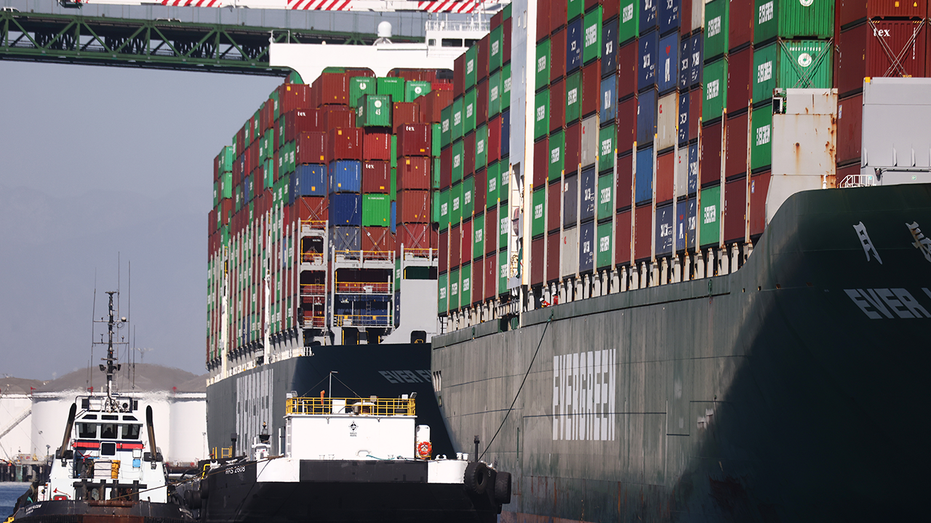
Cargo containers sit stacked on container ships at the Port of Los Angeles, the nation’s busiest container port, on October 15, 2021 in San Pedro, California. As surging inflation and supply chain disruptions are disrupting global economic recovery,
Ports
Ports have been front and center in the discussion of supply chain backlogs, where dozens of ships are off the California coast waiting to unload their cargo at the Ports of Long Beach and Los Angeles.
While many ports are experiencing this congestion, this is not true everywhere. Florida governor Ron DeSantis has announced that his state’s seaports are "open and ready to meet holiday demand."
Robert Bernardo of the Port of Oakland also said they are not experiencing congestion, and are ready to accept more business.
Solving the problem, though, is not as simple as rerouting congested traffic from Los Angeles to Oakland. "Seaports are a very complex network, it is like a domino effect," Bernardo said.
Bernardo noted that commodities and consumer spending drive the products coming off container ships at the ports, and the "root cause" of the supply chain backlog is an increase in e-commerce. The pandemic, he said, "transformed" the way Americans make purchases.
Online holiday shopping this year is expected to reach a record-breaking $207 billion, according to the Adobe Digital Economy Index.
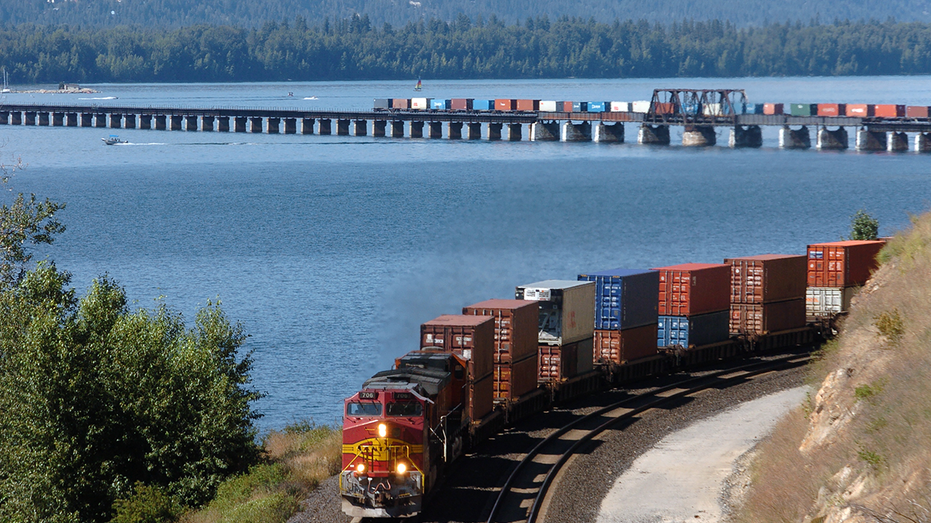
Railroads
Many products that come into U.S. ports are transported across the country via railroad, and AAR's Gray said that backlogs in other areas of the supply chain have negatively impacted his industry’s ability to deliver products.
Gray cited an "unprecedented" volume of products moving through the supply chain, as well as worker shortages, as creating a backlog and preventing products from reaching their destination.
"You can’t just add 10, 15, 20 percent capacity overnight," Gray said, noting that the railroad industry has worked to adjust to the increased demand, but that the influx of products has placed a strain on every level of the supply chain.
The solution, he said, will take time, and there is "no magic."
"The administration is not going to be able to write an executive order which can clear this out," he said. "It’s one of those things that the buying spree is going to have to work its way through the system."
Having 24-hour operations across the supply chain, though, will be critical.
"Our systems have to operate 24-7," he said. "They always have."
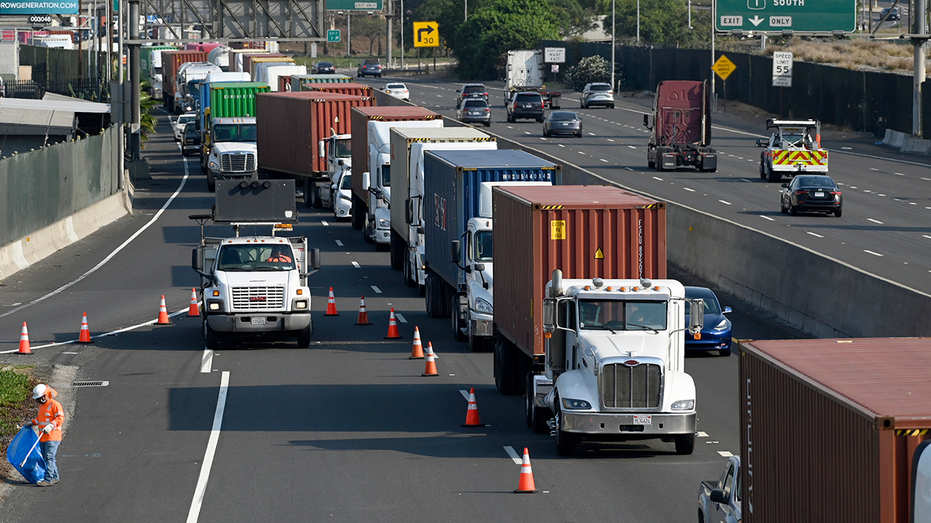
After a fatal accident on 710S Freeway, closures caused traffic delays for motorist and port bound trucks, in Long Beach on Monday, September 20, 2021.
Trucking
The worker shortage that has plagued nearly every industry in the United States has resulted in a shortage of 80,000 truck drivers, according to the American Trucking Association.
This, along with worker shortages through the supply chain, has created the "perfect storm," California Trucking Association CEO Shawn Yadon told FOX Business’ Maria Bartiromo.
Like other industry leaders, Yadon said there is no one silver bullet that will clear the backlog. "The solution overall has to be from every stakeholder in the supply chain," he said, noting each industry must be "synchronized."
"If you look at every step or every link in that supply chain, each one of us needs to be a part of the solution."
CALIFORNIA TRUCKING INDUSTRY LEADER WARNS WORKER SHORTAGE, SHIP BACKLOGS CREATING ‘PERFECT STORM’
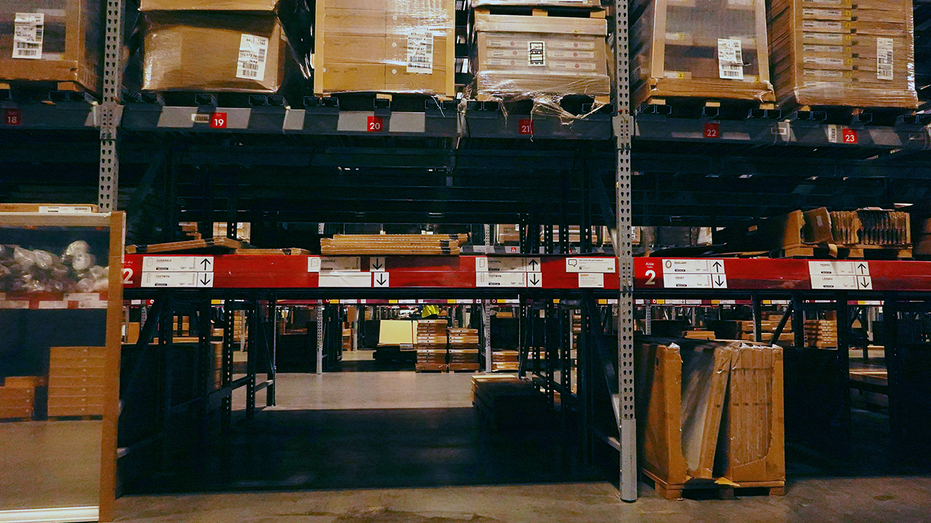
A empty product spots are seen in the warehouse of an IKEA store on October 15, 2021 in the Red Hook neighborhood of Brooklyn borough in New York City. Executives at IKEA have warned of supply chain disruption that could last into next year leaving s
Wholesaler-Distributors
Eric Hoplin if the National Association of Wholesaler-Distributors said his industry represents a third of the U.S. economy, but like many others, is facing serious staffing shortages that could be made worse by Biden’s vaccine mandate.
"Everybody is having trouble finding a lot of people to work, and everyone is having trouble with retention," Hoplin told Fox News Digital.
Biden’s vaccine mandate, which requires federal contractors to be vaccinated or terminated, could force companies to lay off tens of thousands of workers just weeks before Christmas, Hoplin said.
"If the president doesn’t act, Joe Biden truly will be the Grinch that stole Christmas," he said.
"Imagine what’s going to happen just a few weeks before Christmas when the supply chain gets even worse. American families aren’t going to be able to get the gifts under the tree that they’re hoping to."
Hoplin noted that his industry is working to increase staffing and keep store shelves stocked, but that they expect supply chain challenges through 2022.
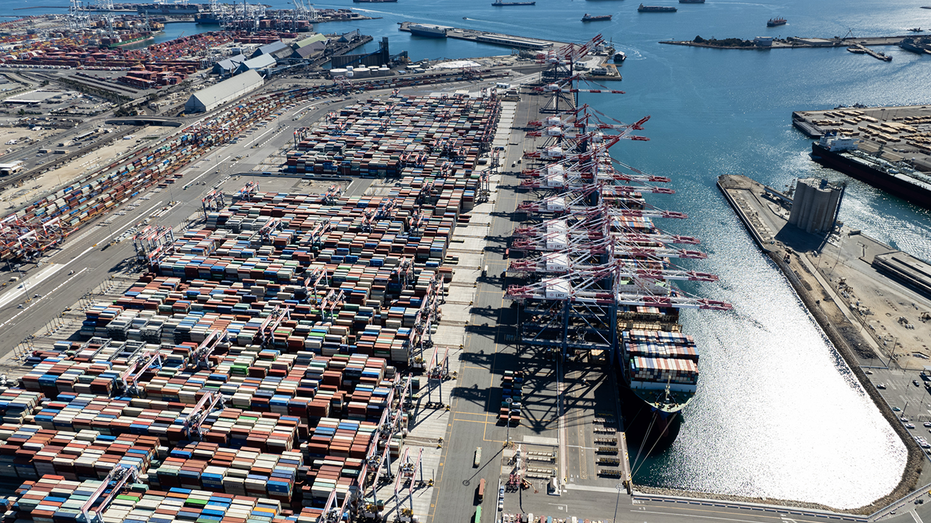
Aerial view of containers waiting at Port of Long Beach to be loaded onto trains and trucks on October 16, 2021 in Long Beach, California.
Exporters
For many exporters, the inability to get supplies into the country also means difficulties getting products out of the country, according to California Business Roundtable President Rob Lapsley.
He called exporting "the other half of the crisis," and noted that agricultural exporters are "almost in a panic."
GET FOX BUSINESS ON THE GO BY CLICKING HERE
"Agriculture is solely dependent to be able to move their goods … on a timely basis so they don’t spoil, so they get to their markets in the right months for when they’re consumed, particularly to China, Japan, and the Asian-pacific countries."
"They have nothing in terms of relief," he said. "So to be able to turn those exports are going to be critical now…all the way through 2022."
Fox News' Daniella Genovese contributed to this report.
